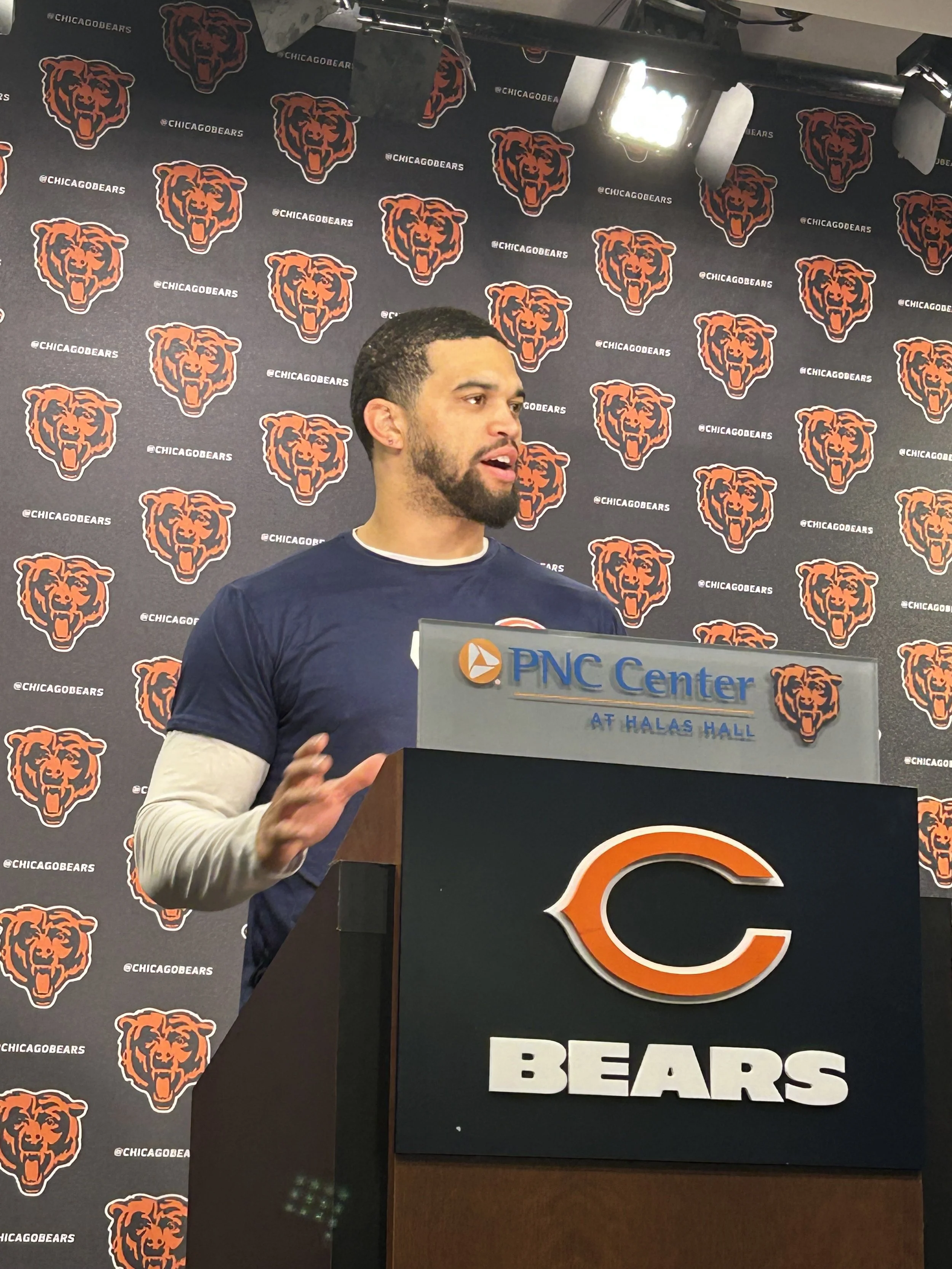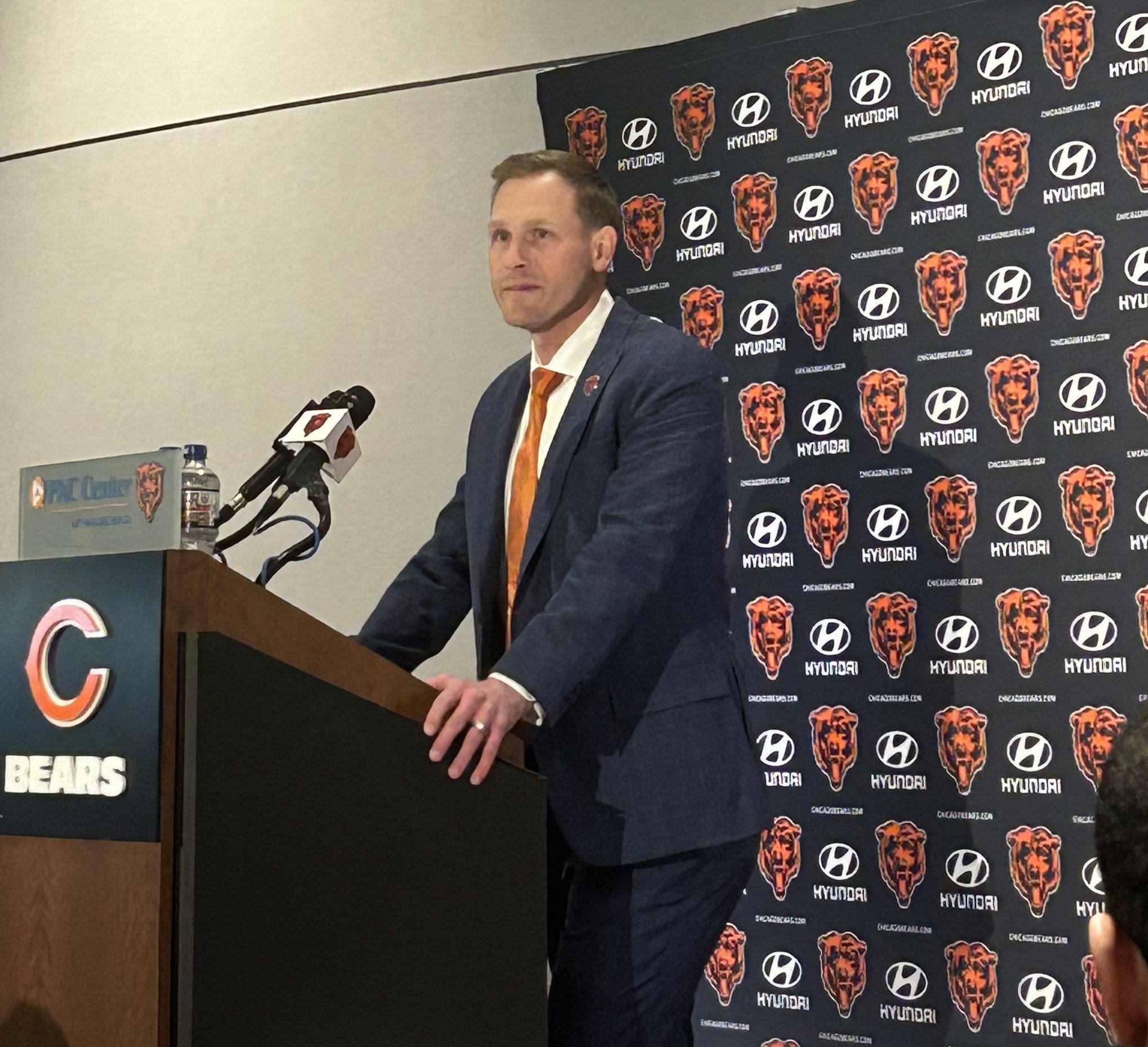Flows is joined by friend of the pod Steve Pennington to do a full breakdown on everything the Bears should do in next week's NFL Draft.
The Monday edition of I'm Not Gon Hold You Hosted By Scott Lewis
Today's Crew: J.R. Bang, Pavy & Tosin
Chapters
0:00 - Intro
2:10 - The Warm Up/Weekend recap
9:25 - Stephen A 2028 is serious
13:04 - Giannis says n*gga!
22:33 - Kyler Gordon extension
26:00 - NBA Playoff Storylines
1:23:03 - NBA Play-In Tournament picks
1:37:37 - Barber’s Chair Shop Ad
1:38:14 - Soccer For Dummies
1:48:38 - Champions League 2nd Leg preview
2:01:08 - Man U problems
2:11:29 - Champions League 4th & 5th spot race
2:15:21 - Outro
The Wednesday (PATREON EXCLUSIVE) edition of I'm Not Gon Hold You Hosted by Scott Lewis
Chapters:
0:00 - Intro
4:31 - A memorable 1st Champions League experience
15:24 - Bears Orientation
24:19 - Nuggets Clean House
30:18 - Luka ejected/Luka’s return to Dallas
39:15 - Outro
The Monday edition of I'm Not Gon Hold You Hosted By Scott Lewis
Today's Crew: J.R. Bang, Courtney Callabro, Pavy & Tosin
Chapters
0:00 - Intro
3:40 - The Warm Up
15:08 - Ovechkin’s complicated history
23:55 - Dodgers tripping for WH visit?
29:34 - Shedeur Sanders/Travis Hunter Pro Day reaction
35:40 - What will the Browns do?
43:59 - The Local Hour
44:16 - Vlad Jr’s deal is raising Kyle Tucker’s value
49:47 - Does Ryan Poles NEED to make the playoffs?
59:51 - Does the Bulls Play In appearance matter?
1:11:49 - Should Bulls trade for Ja/Zion?
1:20:01 - Barber’s Chair Shop Ad
1:21:05 - Basketball HOF Class revealed
1:42:42 - Did the Lakers make a statement in OKC?
1:51:26 - Are the Clippers sneaky?
1:58:34 - Final Western Conference seeding predictions
2:03:58 - Are we sleeping on the Rockets?
2:11:07 - Nothing matters the Celtics are better
2:23:12 - Outro
Chapters
0:00 - Intro
3:40 - The Warm Up
9:42 - RIP Val Kilmer
15:16 - NBA needs Steph Vs Bron in Playoffs
23:45 - Ja Being Ja
30:45 - The Local Hour
31:44 - Bears sign Case Keenum
36:35 - Legit Tyler Warren intrest
42:20 - McCaskeys ain’t selling the team
48:26 - Arlington/New stadium update
57:02 - Ben Johnson/Matt LaFleur beef?
1:04:33 - Should Cubs fans be worried already?
1:09:35 - Rays/A’s playing in Minor League stadiums
1:14:16 - Braves struggles
1:16:43 - TorpedoGate
1:18:51 - Barber’s Chair Shop Ad
1:19:47 - Bang’s epic rant on the state of sports media
1:34:37 - Is Ohtani the best player in sports?
1:41:27 - Micah Parsons Vs Jerry Jones
1:49:00 - League Meetings recap
2:12:36 - Outro
The Monday edition of I'm Not Gon Hold You Hosted By Scott Lewis
Today's Crew: J.R. Bang, Courtney Callabro, Tosin & Pavy
Chapters
0:00 - Intro
5:48 - Wednesday Patreon show announcement
7:32 - Squabbles back in the NBA
13:00 - Who in the NBA has hands?
26:46 - Cooper Flagg = White Tatum
40:29 - Pav & Tosin on Taylor Jenkins firing
44:44 - The Last of KD in Phoenix?
52:11 - Should Giannis demand a trade this summer?
1:00:42 - Lakers defensive woes
1:10:49 - Scott’s Football Club fan decision
1:20:42 - Barber’s Chair Shop Ad
1:22:04 - Premier League final stretch
1:33:22 - Tush Push ban coming
1:39:57 - Browns done with Freaky Shaun
1:50:42 - Will the Dodgers ever lose again?
1:53:30 - Yankees fake cheating?
1:58:54 - MLB opening weekend observations
2:09:10 - Outro
Chapters
0:00 - Intro
5:03 - The Local Hour
5:04 - RIP George Foreman
8:35 - Journalism dying a slow death
22:50 - Year 2 Caleb Williams expectations
32:11 - Offense or defense at pick 10?
42:04 - Pavy pulls up
45:36 - Bulls talk
1:01:31 - Barber’s Chair Shop Ad
1:02:41 - Scott’s Premier League journey
1:15:06 - How will Western Conference shake out?
1:26:37 - Anthony Davis is BACK
1:33:05 - Top 5 biggest American sports brands
1:45:44 - Aaron Rodgers: Retirement or join Steelers
1:52:27 - Top 3 draft picks solidified?
2:00:33 - Raiders mid tier expectations
2:09:29 - Outro
On the Monday edition of the show Scott, J.R. Bang & Courtney give their thoughts on the Bears day 1 free agency moves in the local hour. In hour 2 they breakdown the rest of the deals in the NFL and also a recap of this past weekend in the NBA.
On the Friday edition of the show Dante is back! the crew kick off the show discussing Stephen A's run in with LeBron James, who was in the wrong & the crew debate what fans really want in sports coverage. Scott starts the local hour explaining why he's fed up with former NFL player & current ESPN radio host Chris Canty, reactions to the Bears trading for Jonah Jackson & Joe Thuney, how will the trades change Ryan Poles FA/Draft schedule & who will be the guys that are added to the Bears defensive line. In hour 2 the crew go into all of the news in the NFL hot stove, is this the worst season ever for Mavs fans with Kyrie Irving tearing his ACL & Anthony Davis thinking about sitting the rest of the season, was Lakers owner Jeanie Buss in the wrong about her comments on AD? the Knicks are officially cooked while the Lakers & Warriors keep rolling plus Scott finally has an answer to who's the next face of the league question.
Chapters
0:00 - Intro
11:55 - The Warm Up
15:46 - LeBron presses Stephen A
47:00 - Scott’s sounds off on sports media bashing
53:50 - The Local Hour
54:39 - Chris Canty is an idiot
1:10:08 - Bears add to OL
1:18:37 - Bears hint at bringing back Khalil Mack??
1:21:48 - Should Bears trade for Trey Hendrickson?
1:35:31 - Barber’s Chair Shop Ad
1:36:11 - NFL Hot Stove
1:54:55 - Worst year ever for Mavs
2:02:20 - Jeanie Buss disses AD?
2:07:20 - LeBron/GOAT convo back?
2:12:54 - The Lakers CAN make the NBA Finals
2:26:41 - Scott says Luka will be next NBA face
2:34:10 - The Jimmy Butler effect
2:41:30 - Outro
On this week's episode of RAOP we chop it about why we think ageism in Hip Hop is corny, Steve Smith Sr being milk man of the century, Williams Banks breaking out of prison, Twitch streamers being too horny and more.
On the Friday edition of the show Pavy joins Scott & Bang in Hour 1 to talk all things NBA, Scott & Bang then go over some of the top non Bears stories coming out of the NFL Combine. In the Local Hour we talk about the Combine Bears vibe, how the Bears should pivot from Trey Smith & the homies from The 108 join to talk some White Sox baseball.
Chapters
0:00 - Intro
6:51 - TV reviews with Scott & Bang
14:13 - J.Cole scared of Freddie Gibbs?
27:23 - LeBron’s face of the league comments
45:42 - Retire Joel Embiid
53:48 - Pistons on fire
57:44 - Luka’s revenge
1:00:54 - KD’s next move
1:09:31 - The NBA’s 2nd apron
1:15:20 - Scott’s NBA title contender tiers
1:26:55 - NFL Combine news
1:48:41 - The Local Hour
1:49:56 - Ryan Poles & Ben Johnson speak
2:05:05 - How Bears pivot from Trey Smith
2:12:24 - White Sox talk with The 108
2:46:03 - Outro
Kendrick Lamar's Apple Music Super Bowl Halftime Show has created a lot of Social Media conversation. How does Some Dude feel about the show and the Super Bowl?
Was Pat Mahomes being called the Goat premature? How was Mike's trip to the Royal Rumble and our mental health check.
Pic by Scott Lewis
It’s January 29th, 2025, and the Chicago Bears have done the unthinkable. Well, let me specify: they have done what was once considered impossible for them. The Bears are a franchise that has been mired in mediocrity for quite some time, with one of their biggest issues being the inability to hire the “right” head coach. But for what feels like the first time ever, the Bears made that right move. Former Detroit Lions offensive coordinator Ben Johnson is now the head coach of your Chicago Bears. As someone who has covered this team for five years, I’ve had more than my fair share of moments spent shaking my head at moves that seemed baffling, if not outright foolish. Whether it was the drafting of Mitchell Trubisky or the hiring of Marc Trestman, the Bears have repeatedly muddied their storied history with questionable decisions. Yet, here we are in 2025, and the Bears are making the kind of moves that even the harshest critic has to acknowledge—if not applaud.
On January 21st, Ben Johnson was named the 20th head coach of the Chicago Bears (including the Decatur Staleys), in a move that was as obvious as it was necessary. The Bears have firsthand experience with Johnson’s offensive mind. Most fans and critics will remember the efficiency with which the Lions operated: the running back tandem of David Montgomery and Jahmyr Gibbs combined for over 2,000 rushing yards, while quarterback Jared Goff threw for well over 4,000 yards. But for me, it’s the “stumble touchdown” that remains ingrained in my memory. Taking advantage of defenders’ natural tendency to react to a falling player, Goff faked a stumble for a wide-open touchdown. It was brilliant to see in person, and it’s plays like that that make you a believer in Ben Johnson. While his youth is a plus, it’s his innovative mind that represents exactly the kind of leadership this franchise needs to break free from its cycle of complacency. Simply put, if you had the chance to hire Johnson, you did it without hesitation. Anything less would have been executive malpractice. Even if it doesn’t work out in the long run, this was a decision rooted in logic and vision—a far cry from some of the hires we’ve seen in recent years.
Adding to the excitement are the other coaching hires. Bringing in J.T. Barrett as the quarterbacks coach was a brilliant move, and one I am going to irrationally praise. Barrett’s success at THE Ohio State (undefeated against TTUN) and his experience with the Lions give him credibility as a mentor for Williams, who will need all the support he can get. While Barrett wasn’t responsible for play-calling duties, he oversaw Jared Goff’s best years in the NFL, and that experience will be invaluable to Caleb. Adding to this already impressive coaching staff is lauded defensive coordinator and former New Orleans Saints head coach Dennis Allen. At a time when the Bears are searching for consistency and identity on defense, Allen brings clarity and purpose to a team looking to reclaim its title as the “Monsters of the Midway.” Rounding out the hires is Declan Doyle as offensive coordinator, a former tight ends coach in Denver. This move is a bit trickier to decipher. He’s young (28 years old) and does not have a ton of NFL coaching experience (five years). That said, Ben Johnson has praised his “innovative mind,” and in a league where offensive coordinators are often top choices for head coaching positions, having a young mind to mold and shape is a good thing. All of these hires point in one direction: Ben Johnson intends to win and win now. For once, it feels like the Bears are thinking with clarity and foresight rather than making moves just for the sake of making them.
I’d be remiss, however, if I didn’t address the elephant in the room: Ryan Poles. Here at The Barber’s Chair Network, we’ve had a variety of opinions on him. Some were praiseworthy, while many were critical, with some even calling for his firing. Not long ago, Poles seemed to be on the verge of running out of goodwill. Whether it was his curious choices in coaching staff or his unconventional approach to roster-building—prioritizing skill position players over the offensive line—the criticisms were loud and, often, valid. His decision to build the team backward is something I still struggle to understand, as the Bears have consistently struggled in the trenches. However, these recent moves have given Poles an opportunity to rewrite that narrative. The offensive and defensive lines remain glaring needs, but with the right additions, he could finally provide this team with the foundation it has sorely lacked. This is where the hiring of Ben Johnson should help; Johnson’s offensive philosophy demands a strong line. You can’t have a 2,000-yard rushing attack and a 4,000-yard passer without it. The hope, both mine and that of Bears fans, is that the demands of Johnson’s offense will push Poles to make it a priority. If Poles can address this issue—and if the Bears' new staff can develop their young talent—there is reason to believe this franchise could finally turn the corner.
Covering the Bears hasn’t been easy. The losing seasons, the questionable decisions, the endless cycle of mediocrity…it’s all been exhausting. While I am forever grateful for the opportunity to cover what feels like a first love for me, it’s time for the Bears to put this plan into high gear. The feelings that Bears have now, ones they haven’t felt in a long time, need to be followed by decisive action. The fans deserve more than just hope—they deserve pride. Pride that this organization is finally making the kinds of decisions that make sense. Pride that, even if things don’t work out, they are at least taking the right kinds of risks. Pride that maybe, just maybe, the Bears are finally headed in the right direction. The road ahead is still uncertain and there are still plenty of holes to fill and narratives to change. But for now, you’ve got to give credit where it’s due: the Bears are finally doing things the right way. And for someone, like myself, who has watched this team stumble over itself time and time again, I can’t tell you how good it feels to say that.
Scott is joined by his I'm Not Gon Hold You co-host J.R. Bang (filling in for Flows) to recap Ben Johnson's introductory press conference.
The Chicago Bears have a new coach, Ben Johnson, the highly sought-after Detroit Lions Offensive Coordinator. How will this affect Bang's Bears Fandom and what are his expectations? How does Mike Feel about his Dallas Cowboys and potential Head Coaches?
We also get into a lil bit of Family talk on this weeks episode of Some Dude Pod
Scott & Flows react to the Chicago Bears naming Ben Johnson the next head coach.
Scott & Flows recap the Bears finally beating Green Bay, the end of the season pressers from Ryan Poles, Kevin Warren & George McCaskey, the Bears beginning their coaching search & who do the guys have on their coaching wishlist?




























